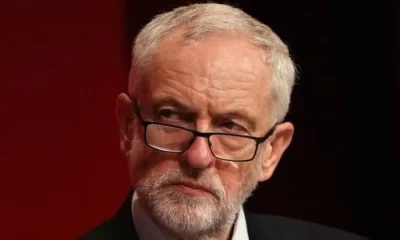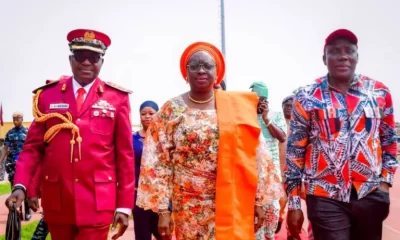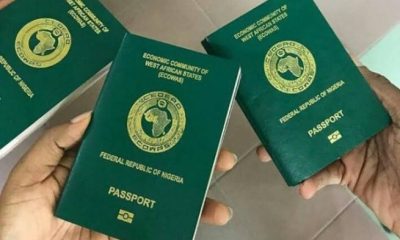News
South Korea’s new president pledges peace, dialogue with North
South Korea’s President Lee Jae-myung pledged to reach out to the nuclear-armed North and “heal wounds” as he assumed office on Wednesday, following a decisive victory in a snap election triggered by his predecessor’s controversial martial law declaration.
The centre-left leader also warned that “rising protectionism and supply chain restructuring” pose an existential threat to Asia’s export-dependent fourth-largest economy, which has been unsettled by global trade disruptions, notably under former US President Donald Trump.
Lee secured a commanding 49.4 per cent of the vote, defeating conservative Kim Moon-soo, who garnered 41.2 per cent. Kim conceded defeat after being hampered by internal party divisions and a third-party candidate splitting the right-wing vote. Lee’s term began immediately after the official certification of the results on Wednesday.
Upon taking office, Lee spoke with South Korea’s top military commander and formally assumed operational control of the armed forces, urging vigilance amid potential provocations from Pyongyang. However, in his first public remarks, he emphasised his readiness for dialogue.
“We will heal the wounds of division and war and establish a future of peace and prosperity,” he said. “No matter how costly, peace is better than war.”
Lee vowed that Seoul would “deter North Korean nuclear and military provocations while opening communication channels and pursuing dialogue and cooperation to build peace on the Korean Peninsula.”
His inauguration came just hours before US tariffs on steel and aluminium were set to take effect, imposing a 50 per cent levy on key South Korean exports.
“The rapid changes in the global order, such as rising protectionism and supply chain restructuring, pose a threat to our very survival,” Lee warned.
Markets responded positively to the election outcome, with the benchmark KOSPI index and the South Korean won both rising on Wednesday.
A Significant Shift
Lee’s approach to North Korea marks a “significant departure” from his hawkish predecessor, as he did not immediately impose preconditions for dialogue, said Hong Min, a senior analyst at the Korea Institute for National Unification. This signals “his desire to resolve disagreements through talks,” Hong told AFP.
Lee held a modest inauguration ceremony at the National Assembly — the same venue where his predecessor deployed armed troops during an attempted suspension of civilian rule.
He also announced key appointments, including long-time adviser Kim Min-seok as prime minister and former unification minister Lee Jong-seok as head of intelligence.
Lee’s first day in office is expected to conclude with a series of congratulatory calls from world leaders, with US President Donald Trump likely to be among the first.
Trump’s top diplomat, Marco Rubio, swiftly congratulated Lee and expressed hope for cooperation, despite Lee’s previous calls for greater distance from the United States.
US Secretary of State emphasised that the Washington-Seoul alliance remains “ironclad,” citing “shared values and deep economic ties.”
The White House described the election as “free and fair” but expressed concerns about “Chinese interference and influence in democracies around the world.”
Chinese President Xi Jinping congratulated Lee, highlighting the “great importance” of China-South Korea relations and expressing willingness to “firmly maintain the direction of good-neighbourly friendship” based on mutual benefit.
Japanese Prime Minister Shigeru Ishiba expressed a desire to “energise cooperation” between Seoul and Tokyo, South Korea’s former colonial ruler.
Indian Prime Minister Narendra Modi also congratulated Lee on social media, expressing hopes to “strengthen” ties with South Korea.
A Positive Outlook
Lee assumes power with his party holding a parliamentary majority secure for the next three years, positioning him well to advance his legislative agenda.
On the streets of Seoul, citizens welcomed Lee’s conciliatory stance towards the North.
“Since our economy and many other aspects of society are closely linked to inter-Korean relations, I hope we can take a long-term perspective and move in a more positive direction,” said Choi Ki-ho, 55.
Lee Ju-yeon, a 42-year-old public sector employee, expressed hope that Lee “will devote himself to uniting our divided nation.”























